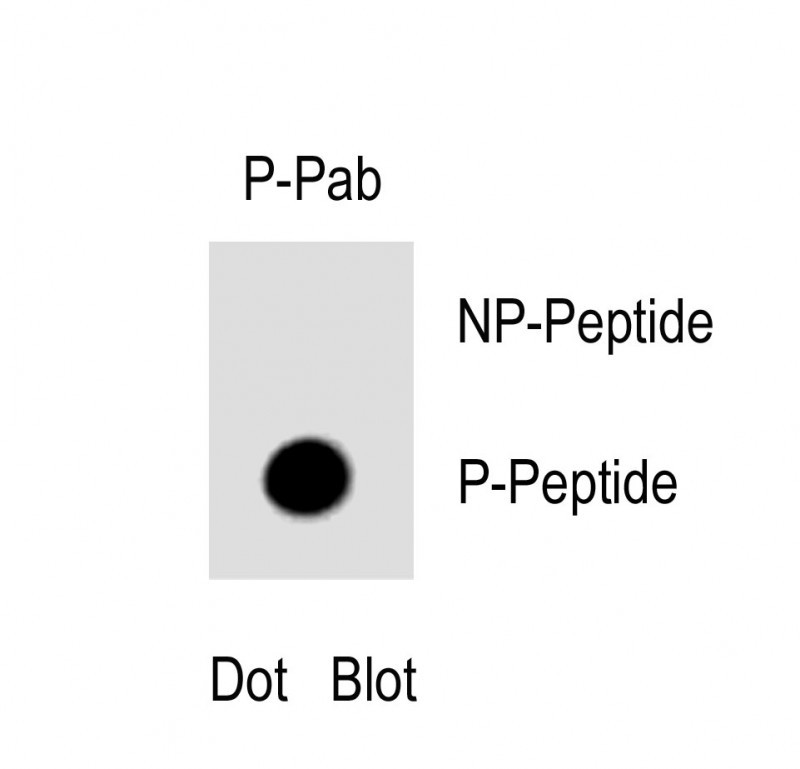Phospho-MAP4K1(S171) Antibody
Affinity Purified Rabbit Polyclonal Antibody (Pab)
- 产品详情
- 文献引用 : 1
- 实验流程
- 背景知识
Application
| WB, E |
|---|---|
| Primary Accession | Q92918 |
| Other Accession | P70218 |
| Reactivity | Human |
| Predicted | Mouse |
| Host | Rabbit |
| Clonality | Polyclonal |
| Isotype | Rabbit IgG |
| Calculated MW | 91296 Da |
| Gene ID | 11184 |
|---|---|
| Other Names | Mitogen-activated protein kinase kinase kinase kinase 1, Hematopoietic progenitor kinase, MAPK/ERK kinase kinase kinase 1, MEK kinase kinase 1, MEKKK 1, MAP4K1, HPK1 |
| Target/Specificity | This MAP4K1 Antibody is generated from rabbits immunized with a KLH conjugated synthetic phosphopeptide corresponding to amino acid residues surrounding S171 of human MAP4K1. |
| Dilution | WB~~1:1000 E~~Use at an assay dependent concentration. |
| Format | Purified polyclonal antibody supplied in PBS with 0.05% (V/V) Proclin 300. This antibody is purified through a protein A column, followed by peptide affinity purification. |
| Storage | Maintain refrigerated at 2-8°C for up to 2 weeks. For long term storage store at -20°C in small aliquots to prevent freeze-thaw cycles. |
| Precautions | Phospho-MAP4K1(S171) Antibody is for research use only and not for use in diagnostic or therapeutic procedures. |
| Name | MAP4K1 (HGNC:6863) |
|---|---|
| Synonyms | HPK1 |
| Function | Serine/threonine-protein kinase, which plays a role in the response to environmental stress (PubMed:24362026). Appears to act upstream of the JUN N-terminal pathway (PubMed:8824585). Activator of the Hippo signaling pathway which plays a pivotal role in organ size control and tumor suppression by restricting proliferation and promoting apoptosis. MAP4Ks act in parallel to and are partially redundant with STK3/MST2 and STK4/MST2 in the phosphorylation and activation of LATS1/2, and establish MAP4Ks as components of the expanded Hippo pathway (PubMed:26437443). May play a role in hematopoietic lineage decisions and growth regulation (PubMed:24362026, PubMed:8824585). Together with CLNK, it enhances CD3-triggered activation of T-cells and subsequent IL2 production (By similarity). |
| Tissue Location | Expressed primarily in hematopoietic organs, including bone marrow, spleen and thymus. Also expressed at very low levels in lung, kidney, mammary glands and small intestine |
For Research Use Only. Not For Use In Diagnostic Procedures.

Provided below are standard protocols that you may find useful for product applications.
BACKGROUND
The c-Jun amino-terminal kinases (JNKs)/stress-activated protein kinases (SAPKs) play a crucial role in stress responses in mammalian cells. The mechanism underlying this pathway in the hematopoietic system is unclear, but it is a key in understanding the molecular basis of blood cell differentiation. We have cloned a novel protein kinase, termed hematopoietic progenitor kinase 1 (HPK1), that is expressed predominantly in hematopoietic cells, including early progenitor cells. HPK1 is related distantly to the p21(Cdc42/Rac1)-activated kinase (PAK) and yeast STE20 implicated in the mitogen-activated protein kinase (MAPK) cascade. Expression of HPK1 activates JNK1 specifically, and it elevates strongly AP-1-mediated transcriptional activity in vivo. HPK1 binds and phosphorylates MEKK1 directly, whereas JNK1 activation by HPK1 is inhibited by a dominant-negative MEKK1 or MKK4/SEK mutant. Interestingly, unlike PAK65, HPK1 does not contain the small GTPase Rac1/Cdc42-binding domain and does not bind to either Rac1 or Cdc42, suggesting that HPK1. activation is Rac1/Cdc42-independent. These results indicate that HPK1 is a novel functional activator of the JNK/SAPK signaling pathway.
REFERENCES
Hu M.C.-T., Genes Dev. 10:2251-2264(1996).
Beausoleil S.A., Proc. Natl. Acad. Sci. U.S.A. 101:12130-12135(2004).
Wissing J., Mol. Cell. Proteomics 6:537-547(2007).
终于等到您。ABCEPTA(百远生物)抗体产品。
点击下方“我要评价 ”按钮提交您的反馈信息,您的反馈和评价是我们最宝贵的财富之一,
我们将在1-3个工作日内处理您的反馈信息。
如有疑问,联系:0512-88856768 tech-china@abcepta.com.






















 癌症的基本特征包括细胞增殖、血管生成、迁移、凋亡逃避机制和细胞永生等。找到癌症发生过程中这些通路的关键标记物和对应的抗体用于检测至关重要。
癌症的基本特征包括细胞增殖、血管生成、迁移、凋亡逃避机制和细胞永生等。找到癌症发生过程中这些通路的关键标记物和对应的抗体用于检测至关重要。 为您推荐一个泛素化位点预测神器——泛素化分析工具,可以为您的蛋白的泛素化位点作出预测和评分。
为您推荐一个泛素化位点预测神器——泛素化分析工具,可以为您的蛋白的泛素化位点作出预测和评分。 细胞自噬受体图形绘图工具为你的蛋白的细胞受体结合位点作出预测和评分,识别结合到自噬通路中的蛋白是非常重要的,便于让我们理解自噬在正常生理、病理过程中的作用,如发育、细胞分化、神经退化性疾病、压力条件下、感染和癌症。
细胞自噬受体图形绘图工具为你的蛋白的细胞受体结合位点作出预测和评分,识别结合到自噬通路中的蛋白是非常重要的,便于让我们理解自噬在正常生理、病理过程中的作用,如发育、细胞分化、神经退化性疾病、压力条件下、感染和癌症。






